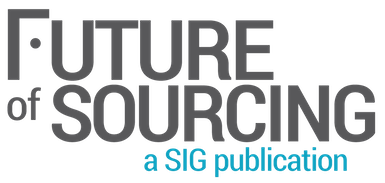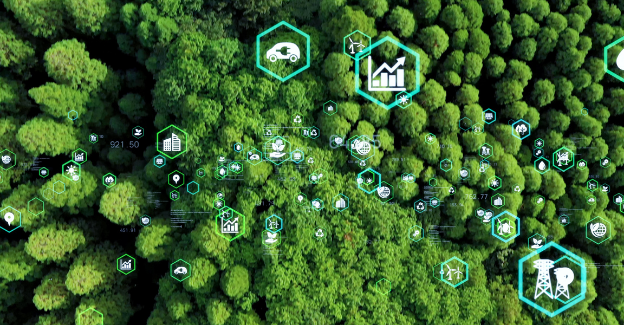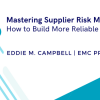America’s Supply Chain Resilience: Why President Biden’s Executive Order Falls Short
The COVID-19 crisis has demonstrated the importance of building sustainable and resilient global supply chains, and world leaders are taking action. In the United States, for example, President Biden has signed an executive order to create more resilient and secure supply chains, starting with a 100-day review. This will assess vulnerabilities and ensure greater domestic production, built-in redundancies, adequate stockpiles, safe and secure digital networks, and a world-class American manufacturing base and workforce.
While Biden’s supply chain initiative provides a guideline for organizations to strengthen their capacity to respond to international disasters and emergencies, sustainability risks around climate, human rights and labor, ethics, and more linger within supplier organizations and their networks – all issues the order falls short of addressing. Data shows 80% of suppliers lack supply chain due diligence measures, 57% aren’t monitoring working conditions, and 44% lack health and safety preparedness.
While a key objective of the order is to promote domestic production of critical items, to truly strengthen the resilience of America’s supply chains, suppliers must be viewed through more than just that single lens. Let’s take a look at how companies can start their journeys toward building supply chain partnerships that integrate environmental performance and ethical factors into their operations.
Carbon Action and Scope 3 Emissions
Thousands of companies are deepening their commitments to reduce greenhouse gas (GHG) emissions, helping to keep the 1.5C goal of the Paris Agreement from “slipping out of reach.” But typical corporate GHG reduction strategies often focus on Scope 1 and 2 emissions, which are clearly visible under the organization’s directive and can show immediate results.
To achieve the substantive carbon reductions needed to keep our planet from reaching a tipping point, companies must start tackling emissions embedded within their supply chain (Scope 3). One of the greatest challenges for corporations is that 70% to 80% of their emissions occur upstream and downstream in their value chains. This is only exacerbated by the fact that there is a massive shortfall in supplier carbon reporting and action across the supply chain.
To overcome these hurdles, companies can accelerate investment in supply chain sustainability monitoring, including carbon reduction efforts, as a foundational element for building long-term viability. Companies can also create engagement structures and carbon action targets across the supply chain to set goals in areas like obliging suppliers to set carbon reduction targets; substituting purchased products or materials with lower-emission alternatives; focusing on significant supply chain and emissions hotspots; and developing guidelines to standardize internal carbon pricing methodology and defining minimum pricing levels for achieving the required reductions.
Human Rights Management in Supply Chains
Environmental risks aren’t the only issues that must be addressed in the supply chain. According to the International Labor Organization (ILO), more than 40 million people are victims of modern slavery, and a recent sustainable procurement survey reveals that even if 64% of large corporations have a supplier code of conduct, only 38% of them evaluate their partners every year.
It is no wonder that human rights have increasingly made their way into mainstream legislation. A group of 105 investors, known as the Investor Alliance for Human Rights, called on international governments to mandate corporate human rights due diligence. These sustainable investors, who incorporate environmental, social and ESG criteria into investment decisions, now represent more than $30 trillion globally. This means there is now a great need for companies to carefully select their suppliers with regard to human rights issues – not only because it is the right thing to do on an ethical level, but it’s also the right thing to do for business.
Companies can create safer supply chains for their workers by monitoring their CSR impact across the supply chain – from codes of conduct to self-assessments and auditing, and ratings and collaboration to financial incentives. This marks a move away from the pass or fail, compliance and audit approach and toward supplier sustainability ratings. This approach promotes more consistent performance monitoring, which encourages continuous improvement and supports value creation, thereby driving sustainable, innovative and resilient supply chains that put workers’ safety and livelihoods first.
If companies want to leverage sustainability to mitigate climate risks and become a purposeful and socially responsible business, more is needed – more data-centric reporting on strategic initiatives, more visibility into supplier risks, and more focus on the supply chain. And this doesn’t have to be a daunting task. There are models and strategies that companies can take to influence positive behaviors and actions with their partners to create and amplify impact across global value chains and the communities they support.
Now more than ever, there is an urgent call to action for companies across the globe to place sustainability at the forefront of their value chain initiatives. With the right strategies and tools in place, real change can happen through the supply chain.
Want to learn more on how to rebuild better? Check out the EcoVadis session “Rethink, Rebuild: Leveraging Sustainable Procurement to Reinvent Your Supply Chain” at the upcoming SIG Procurement Technology Summit on Wednesday May 5 at 12:20 PM ET.









